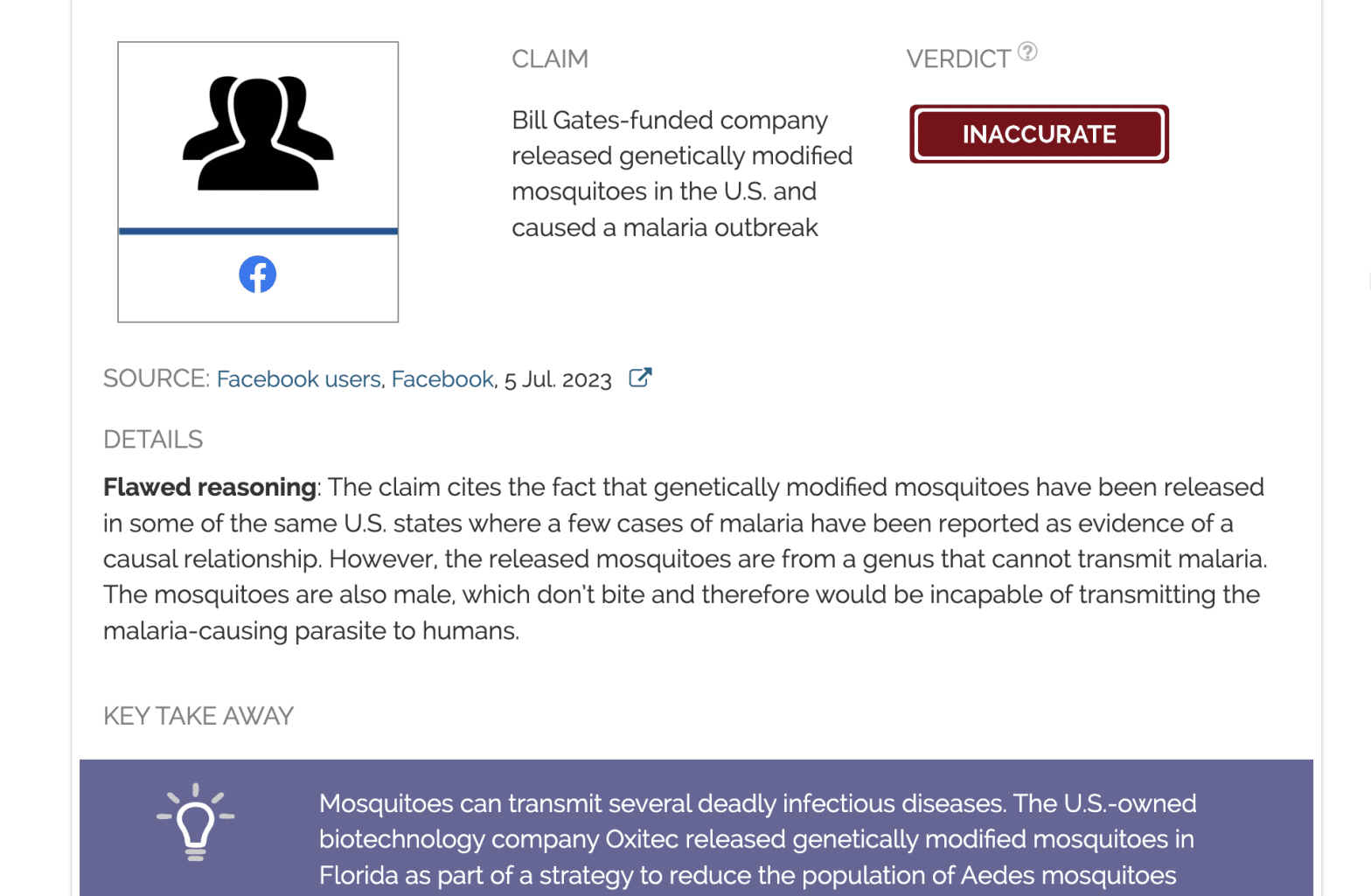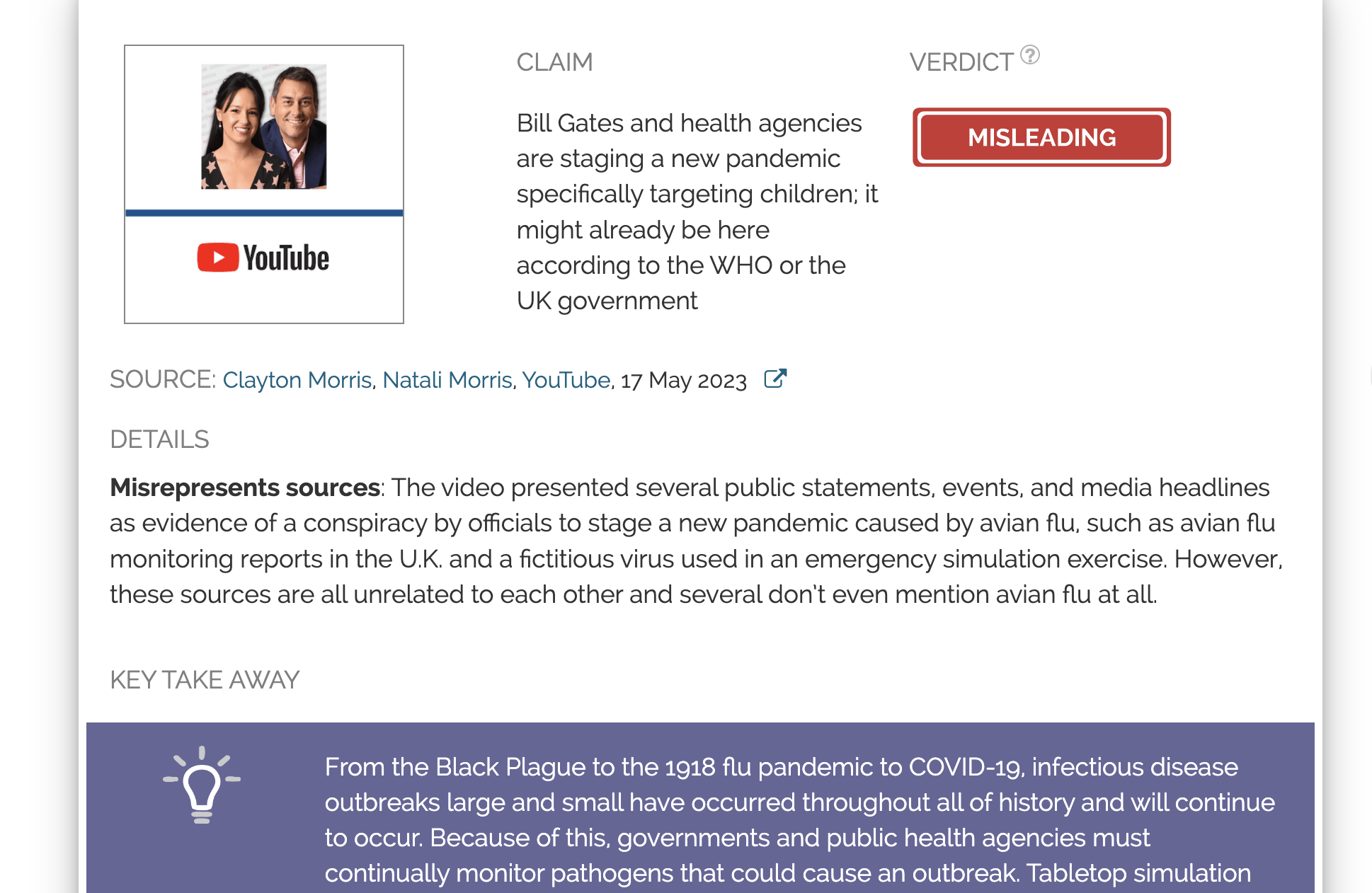- Health
2023 malaria cases in the U.S. are unrelated to the release of genetically modified mosquitoes, contrary to viral claims online
Key takeaway
Mosquitoes can transmit several deadly infectious diseases. The U.S.-owned biotechnology company Oxitec released genetically modified mosquitoes in Florida as part of a strategy to reduce the population of Aedes mosquitoes responsible for diseases like dengue and West Nile fever. However, these mosquitoes cannot transmit malaria because the parasite that causes malaria is only borne by Anopheles, a different genus of mosquito.
Reviewed content

Verdict:
Claim:
Bill Gates-funded company released genetically modified mosquitoes in the U.S. and caused a malaria outbreak
Verdict detail
Flawed reasoning: The claim cites the fact that genetically modified mosquitoes have been released in some of the same U.S. states where a few cases of malaria have been reported as evidence of a causal relationship. However, the released mosquitoes are from a genus that cannot transmit malaria. The mosquitoes are also male, which don’t bite and therefore would be incapable of transmitting the malaria-causing parasite to humans.
Full Claim
Bill Gates-tied company released genetically modified mosquitoes in the U.S. and caused a malaria outbreak; “Bill Gates has been releasing GMO mosquitoes in Florida and Texas and now, those two states, coincidentally, have malaria”; “Bill Gates wants you to experience malaria”
Review
Mosquitoes serve as vectors for a number of potentially fatal diseases like dengue, chikungunya, Yellow fever, and West Nile fever, as well as malaria and Japanese encephalitis. Altogether, they cause hundreds of thousands of deaths each year. The parasitic disease malaria alone caused more than 600,000 deaths in 2021 and is the third leading cause of death among children aged between one month to about five years[1].
For the first time in twenty years, the U.S. Centers for Disease Control and Prevention reported five cases of locally acquired malaria in Florida and Texas in June 2023. This news led some social media users to imply that the reason for the outbreak was the earlier release of genetically modified mosquitoes at Bill Gates’ initiative.
For example, one video on Facebook stated “Bill Gates has been releasing GMO mosquitoes in Florida and Texas and now, those two states, coincidentally, have malaria”, while another claimed that “Bill Gates wants you to experience malaria”. However, this claim is baseless, as we show below.
Contrary to what was implied on social media, the release of genetically modified mosquitoes isn’t Bill Gates’ doing. The Bill and Melinda Gates Foundation awarded grants to the biotechnology company Oxitec, which has been working on the control of insect populations through genetic technology.
One way to prevent the spread of mosquito-borne infections is to reduce the size or spread of the mosquito population: fewer mosquitoes mean fewer vectors capable of spreading diseases to humans.
In an attempt to do so, Oxitec released genetically modified mosquitoes in the Florida Keys in 2021 and 2022.
These mosquitoes, which are male only, have been genetically modified so that they will generate non-viable female offspring through their mating with natural mosquitoes. Since only female mosquitoes bite, this approach will result in the propagation of a non-biting, male-only new generation of mosquitoes and a reduction in the number of female mating partners. Successive releases of such genetically modified mosquitoes should gradually reduce the size of the adult mosquito population of the region.
More specifically, Oxitec mosquitoes carry a laboratory-engineered gene that, once passed on to their progeny, is activated only in female larvae and causes the production of a certain protein to rise incrementally. The unrestricted production of this protein saturates the protein-making machinery of the female mosquito and prevents it from producing the essential proteins it needs to grow and survive, eventually leading to its death.
The mosquitoes released in Florida by Oxitec cannot transmit malaria. Firstly, a mosquito bite is necessary for the mosquito to transmit the malaria-causing parasite to a human. The Oxitec mosquitoes are male only and therefore don’t bite. Secondly, the Oxitec mosquitoes belong to the Aedes genus. Aedes mosquitoes, such as Aedes aegypti, are responsible for transmitting viral fevers like dengue and Chikungunya, but not malaria. Malaria is instead transmitted through the bite of mosquitoes from a different genus, Anopheles, that Oxitec did not release in Florida.
The Associated Press and AFP reached out to malaria and mosquito experts who all agreed that Oxitec mosquitoes are unrelated to the 2023 cases of malaria. USA Today and Politifact also reviewed this claim and found it to be false.
In summary, the release of genetically modified mosquitoes by Oxitec isn’t responsible for the malaria outbreak of 2023 in the U.S.. Oxitec’s mosquitoes belong to a genus that cannot transmit the parasite responsible for malaria. Though rare, malaria cases aren’t unheard of in the U.S. Scientific research forecasts that the global rise in the world’s temperature will favor the spread of disease-carrying mosquitoes in temperate areas. A rise in outbreaks of mosquito-borne diseases like malaria in North America over the next decades can thus be expected[2-6].
REFERENCES
- 1 – Perin et al. (2021) Global, regional, and national causes of under-5 mortality in 2000–19: an updated systematic analysis with implications for the Sustainable Development Goals. The Lancet Child & Adolescent Health.
- 2 – Ryan et al. (2019) Global expansion and redistribution of Aedes-borne virus transmission risk with climate change. PLoS Neglected Tropical Diseases.
- 3 – Felipe J Colón-González et qla. (2021) Projecting the risk of mosquito-borne diseases in a warmer and more populated world: a multi-model, multi-scenario intercomparison modelling study. The Lancet Planetary Earth.
- 4 – Hertig (2019) Distribution of Anopheles vectors and potential malaria transmission stability in Europe and the Mediterranean area under future climate change. Parasites & Vectors.
- 5 – Kraemer et al. (2019) Past and future spread of the arbovirus vectors Aedes aegypti and Aedes albopictus. Nature microbiology.
- 6 – Carminade et al. (2014) Impact of climate change on global malaria distribution. PNAS.



